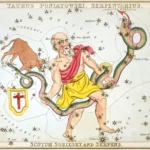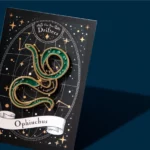The night sky has always fascinated humanity, with its sparkling tapestry of stars and its mysterious celestial bodies. One aspect of the night sky that has intrigued people for centuries is the collection of constellations known as the Zodiac. These twelve constellations have captivated cultures around the world, each with their own unique mythological origins and symbolism. From Aries the Ram to Pisces the Fish, these zodiac constellations have a rich history and hold immense significance in ancient astrology. In this article, we will explore the origins and mythological stories behind each of these captivating constellations, shedding light on the ancient wisdom they have held for generations.
Contents
- Ancient Astrology
- The Zodiac Constellations
-
Mythological Origins
- The Story of Aries
- The Legend of Taurus
- The Twins: Castor and Pollux
- Cancer and the Greek Legend
- The Myth of Leo
- Virgo: The Goddess of Harvest
- The Scales: Libra’s Story
- The Scorpion’s Tale
- Sagittarius: The Archer’s Myth
- Capricorn and the Sea-Goat
- Aquarius: The Water-Bearer’s Story
- Pisces: The Fish and Aphrodite
- Ophiuchus: The Forgotten Sign
- Conclusion
-
Frequently Asked Questions
- What is astrology?
- How old is astrology?
- Why are there 12 zodiac constellations?
- Are the zodiac signs the same as the constellations?
- Is astrology considered a science?
- Can astrology predict the future?
- What is the significance of the zodiac constellations?
- Are there any new zodiac signs?
- Can astrology help improve relationships?
- Is there a scientific basis for the influence of astrology?
- References
-
Frequently Asked Questions
- 1. How many zodiac constellations are there?
- 2. What is the significance of the zodiac constellations in astrology?
- 3. Are the zodiac constellations the same as the astrological signs?
- 4. Is Ophiuchus a part of the zodiac constellations?
- 5. What is the mythological origin of Aries?
- 6. What is the story behind Cancer, the Crab?
- 7. Who were the Gemini twins in mythology?
- 8. What is the connection between Leo and Greek mythology?
- 9. What is the story behind Pisces, the Fish?
- 10. Why is Ophiuchus often forgotten or omitted from the zodiac?
- References
- Read More
Ancient Astrology

Ancient astrology entails a deep connection between the celestial bodies and human existence, playing a significant role in shaping belief systems and guiding individuals throughout history. Origins of astrology can be traced back to ancient civilizations such as Mesopotamia and ancient Egypt, where the movements of the stars and planets were believed to influence human destinies. The Zodiac constellations, specifically, hold a special significance in astrology as they provide a framework for understanding personality traits, predicting future events, and determining astrological compatibility. These constellations served as a celestial map, allowing ancient astrologers to navigate the vast expanse of the night sky and make connections between the heavens and earthly affairs. Today, while astrology is often seen as a form of entertainment or personal guidance, its deep-rooted history and cultural significance continue to fascinate individuals seeking a deeper understanding of themselves and the world around them.
Origins of Astrology
The origins of astrology can be traced back to ancient civilizations such as Mesopotamia, Egypt, and Greece. The study of celestial bodies and their influence on human affairs was deeply ingrained in the religious and cultural practices of these societies. In Mesopotamia, the ancient Babylonians developed one of the earliest systems of astrology, basing their predictions on the movements of planets and stars. They believed that the positions of celestial bodies at the time of a person’s birth could provide insight into their personality traits and destiny. Similarly, the ancient Egyptians practiced astrology, associating different gods and goddesses with specific celestial bodies. The Greeks further developed the field, introducing the concept of the Zodiac and incorporating it into their mythological narratives.
Astrology became a widespread practice in various cultures, including the Hindu, Chinese, and Mayan civilizations, each with their own unique interpretations and methods. While early astrology focused largely on predicting celestial events and interpreting their influence on human affairs, it also served practical purposes such as guiding agricultural activities and determining auspicious times for important events.
Over time, astrology evolved and incorporated different philosophical and scientific traditions. In the Renaissance period, astrology experienced a revival, blending with concepts from astronomy and alchemy. However, with the rise of modern science and the development of astronomy, astrology gradually lost its scientific credibility and became marginalized in the academic realm. Today, astrology is often considered a pseudoscience, but it continues to thrive as a popular belief system, offering guidance, self-reflection, and entertainment to many individuals.
The origins of astrology are deeply intertwined with the beliefs and cultural practices of ancient civilizations. Although its scientific validity may be disputed, astrology’s historical significance and enduring popularity make it an intriguing subject of study and exploration.
Link: Ophiuchus: The Serpent Bearer
Significance of Constellations
The significance of constellations in ancient astrology cannot be overstated. These celestial patterns served as a guide for ancient civilizations in understanding the cosmos and its influence on human affairs. One of the primary roles of constellations was their use in determining the zodiac signs. The zodiac sign an individual is born under is believed to shape their personality traits, character, and even destiny. Each zodiac sign is associated with specific constellations, and the position of these constellations at the time of a person’s birth is thought to influence their cosmic energy. The constellations within the zodiac also help astrologers determine an individual’s sun sign and explore the unique qualities and traits associated with each sign. These constellations play a crucial role in astrology charts and horoscopes, as they provide a framework for mapping planetary movements and making predictions based on astrological alignments. Understanding the significance of constellations allows individuals to delve deeper into the complexities of astrology and gain insights into their own lives and relationships. Each constellation holds its distinct symbolism and cosmic energy, which astrologers interpret to provide guidance and understanding to those seeking astrological insights. Whether it’s identifying personal strengths and weaknesses, predicting future events, or exploring compatibility with others, the significance of constellations remains a fundamental aspect of astrology, keeping the ancient wisdom alive in the modern world.
| Zodiac Sign | Associated Constellation |
|---|---|
| Aries | Constellation Aries |
| Taurus | Constellation Taurus |
| Gemini | Constellation Gemini |
| Cancer | Constellation Cancer |
| Leo | Constellation Leo |
| Virgo | Constellation Virgo |
| Libra | Constellation Libra |
| Scorpio | Constellation Scorpio |
| Sagittarius | Constellation Sagittarius |
| Capricorn | Constellation Capricorn |
| Aquarius | Constellation Aquarius |
| Pisces | Constellation Pisces |
| Ophiuchus | Constellation Ophiuchus |
The Zodiac Constellations
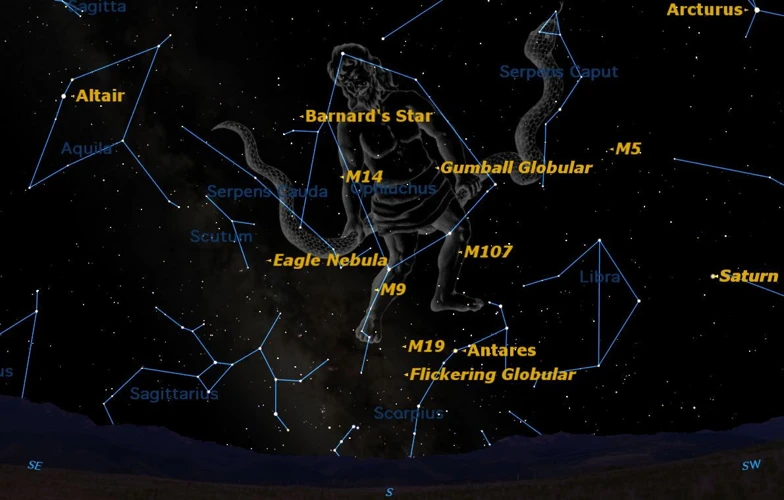
The Zodiac constellations, consisting of twelve distinct star patterns, have been a subject of fascination and interpretation for centuries. These constellations, namely Aries the Ram, Taurus the Bull, Gemini the Twins, Cancer the Crab, Leo the Lion, Virgo the Virgin, Libra the Scales, Scorpio the Scorpion, Sagittarius the Archer, Capricorn the Sea-Goat, Aquarius the Water-Bearer, and Pisces the Fish, each possess their own unique symbolism and characteristics that are believed to influence personality traits and life paths. These constellations serve as a celestial roadmap, guiding astrologers in their interpretation of an individual’s horoscope and compatibility with others. Whether it’s the fiery and passionate nature of Leo or the intellectual and detached qualities of Aquarius, the Zodiac constellations offer a lens through which we can better understand ourselves and our relationships.
Aries: The Ram
Aries, often referred to as “The Ram,” is the first constellation in the zodiac. This fiery and assertive sign is associated with leadership, courage, and determination. In Greek mythology, Aries is linked to the Golden Fleece, a symbol of power and adventure. The story goes that the king of Thessaly had a golden ram with valuable fleece, but it was stolen by a prince named Phrixus. To escape his stepmother’s wrath, Phrixus and his sister Helle rode on the ram’s back, flying across the sea. However, during their journey, Helle fell off and perished in the water, giving the nearby sea the name “Hellespont.” After safely arriving in Colchis, Phrixus sacrificed the ram and presented its golden fleece to the king as a gift. This tale highlights the bravery and resourcefulness associated with Aries. Astrologically, Aries represents individuals born between March 21 and April 19, known for their independent spirit and ability to take initiative. The influence of Aries can be seen in those who possess a strong drive to conquer obstacles and lead with confidence. It is said that those under the sign of Aries exhibit a pioneering spirit and are often found at the forefront of new beginnings and ventures.
Taurus: The Bull
Taurus, represented by the powerful symbol of the bull, is one of the twelve zodiac constellations that have captured the imagination of countless cultures throughout history. In mythology, the story of Taurus is often associated with the Greek legend of Zeus, who transformed himself into a magnificent white bull to charm and carry away Europa, a Phoenician princess. The bull’s gentle nature and allure were irresistible to Europa, leading her to climb onto its back. Suddenly, the bull swiftly carried her away, swimming across the sea to the island of Crete. This mythological tale exemplifies the Taurus’ traits of strength, determination, and sensuality. Those born under the sign of Taurus are known for their steadfastness, reliability, and grounded nature. They possess an innate ability to persevere through challenges with unyielding determination. With their strong sense of loyalty and appreciation for comforts, Taureans find joy in the sensory pleasures of life. They have a deep connection to nature, often seeking solace among serene landscapes. The influence of Taurus can be seen in individuals who exhibit unwavering determination to achieve their goals, a strong work ethic, and a genuine appreciation for the finer things in life. Embodying the essence of the bull, Taurus represents strength, stability, and a profound appreciation for the beauty that surrounds us.
Gemini: The Twins
In the realm of astrology, Gemini is symbolized by the Twins. This zodiac constellation holds a profound significance in mythology and astrological interpretation. Represented by the prominent twin figures, Castor and Pollux, Gemini embodies duality, versatility, and a multifaceted personality. The twins are said to be the offspring of Leda, the Queen of Sparta, and Zeus, the mighty Greek god. Castor, known for his exceptional skill in horsemanship and hunting, was mortal, while Pollux, gifted with great strength and prowess, was immortal. Their unique bond and companionship are eternally represented in the constellation, where the stars Castor and Pollux stand side by side. Gemini individuals are known for their intellectual curiosity, adaptability, and sociable nature. Their inherent duality presents a spectrum of characteristics, ranging from intense extroversion to introspective introversion. They possess an innate ability to see various perspectives and adapt to different situations, making them excellent communicators and natural-born leaders. The constellation of Gemini reminds us of the complexity and richness of human nature, encapsulating the intricate dance between opposites within one’s personality. To explore the symbolic depth of Gemini further, the growing importance of cybersecurity may serve as a thought-provoking parallel. Just like the twins navigating multiple dimensions simultaneously, the realm of cybersecurity requires a profound understanding of ever-changing threats and the ability to adapt and respond effectively to protect sensitive information and systems.
Cancer: The Crab
Cancer, represented by the symbol of the crab, is one of the twelve celestial constellations in the Zodiac. In ancient mythology, Cancer is associated with the story of Hercules and the Hydra. According to the tale, Hercules was battling the multi-headed Hydra when a giant crab, sent by the goddess Hera, came to aid the Hydra. However, Hercules crushed the crab with his mighty foot, and as a reward for its loyalty, Hera placed the crab among the stars. This legend explains why Cancer is positioned between Leo and Gemini in the night sky.
In Astrology, individuals born between June 21 and July 22 fall under the zodiac sign of Cancer. Cancerians are known for their emotional depth, intuition, nurturing nature, and loyalty. Like the protective shell of a crab, those born under this sign are often perceived as having a tough exterior that shields their vulnerability. Cancerians are deeply connected to their family and home, finding solace and comfort within their personal spaces.
Cancer is a cardinal water sign, symbolizing the nurturing and caring qualities associated with water. People born under this sign tend to be deeply empathetic, often putting the needs of others before their own. They are also known for their strong intuition and ability to understand the emotions of those around them. Cancers value security and stability, often seeking a sense of emotional well-being in their relationships and environments.
In terms of compatibility, Cancer is said to be most compatible with fellow water signs such as Scorpio and Pisces, as they share similar emotional depths and understanding. However, Cancerians can also form strong connections with earth signs like Taurus and Virgo, who appreciate their loyalty and dedication. On the other hand, they may find challenges in relationships with fire signs like Aries and Sagittarius, as their energies and priorities can sometimes clash.
Understanding the mythological origins and astrological traits associated with Cancer deepens our appreciation for this constellation and its impact on astrology. Whether you believe in the influence of the stars or simply find joy in exploring the rich tapestry of myths and legends, Cancer and its representation as the crab continues to captivate our imaginations.
Leo: The Lion
In the realm of Zodiac constellations, Leo, also known as The Lion, holds a prominent position. This majestic constellation is one of the most recognizable in the night sky, with its distinctive shape resembling the regal lion it represents. In Greek mythology, Leo is associated with the Nemean Lion, a monstrous creature with an invincible hide that terrorized the land. According to the myth, the Nemean Lion was slain by the mighty hero Hercules as one of his twelve labors. Hercules, renowned for his strength and bravery, strangled the lion with his bare hands, displaying his prowess and earning his place among the gods. As a result of this feat, Zeus placed the Nemean Lion in the heavens as the constellation Leo, forever immortalizing the courageous battle. Astrologically, those born under the sign of Leo are said to inherit qualities attributed to the lion: boldness, leadership, and a regal presence. Leos are often associated with a strong sense of self-confidence, creativity, and a charismatic nature that draws others towards them. They are known for their fiery passion and unwavering determination, making them natural-born leaders and celebrities. The symbol of Leo, depicted as a lion, is a representation of their fierce spirit and commanding presence. Whether it is their bravery in conquering challenges or their magnetic personality that captivates those around them, Leos truly embody the essence of The Lion in all its glory.
Virgo: The Virgin
In the realm of Zodiac constellations, Virgo stands as the sixth astrological sign characterized by its representation of a maiden or a young woman, often depicted holding an ear of wheat. The Virgo constellation is one of the largest constellations in the sky, containing many prominent stars, including Spica, the brightest star in the constellation. Virgo is associated with the element of Earth, embodying qualities such as practicality, organization, and attention to detail.
In mythological origins, Virgo is often linked to Demeter, the Greek goddess of harvest and agriculture. According to the myth, Demeter was devastated when her daughter Persephone was abducted by Hades, the god of the Underworld. In her grief, Demeter neglected her duties as the goddess of harvest, resulting in a barren and desolate Earth.
It was only when Persephone was allowed to return to Earth for part of the year that Demeter’s joy and fertility were restored. This cyclical nature, reflected in the changing of the seasons, is believed to be symbolized by the Virgo constellation. The story of Demeter and Persephone teaches lessons of nurturing, labor, and rebirth, which resonate with the characteristics associated with Virgo.
Astrologically, individuals born under the sign of Virgo are often attributed with traits such as analytical thinking, practicality, attention to detail, and a strong work ethic. They are known for their meticulous nature and their ability to organize and plan effectively. The industrious and methodical nature of Virgos makes them well-suited for occupations that require precision and reliability.
Virgo, the constellation of the Virgin, holds a significant place in astrology and mythology. Its association with the goddess of harvest and agricultural cycles reflects the values of hard work, attention to detail, and rejuvenation. The presence of Virgo in the night sky continues to inspire and guide astrologers and individuals seeking to understand the intricate connections between the heavens and human existence.
Libra: The Scales
According to astrological tradition, Libra is represented by the image of “The Scales,” symbolizing balance and justice. This sign falls under the element of Air, suggesting a strong focus on intellect and communication. People born under the sign of Libra are known for their diplomacy, fairness, and harmonious nature. Libra individuals have a natural ability to weigh different perspectives and find equilibrium in various situations. They are natural peacemakers who strive to create a harmonious environment in all aspects of their lives. Libra is ruled by the planet Venus, which adds a touch of beauty, creativity, and love to their personality. As social beings, Libras thrive in relationships and value partnerships that provide support and companionship. The symbol of the scales emphasizes their desire for justice and fairness, as they seek to maintain a balance between their own needs and the needs of others. Libras have a keen eye for aesthetics, appreciating art, culture, and beauty in all its forms. Their strong sense of diplomacy and fairness often makes them sought-after mediators in conflicts. However, Libras may sometimes struggle with indecisiveness, as their desire to consider all sides of a situation can make it challenging for them to make firm choices. Libra individuals bring harmony and balance to the world around them, making them valued and loved by those who appreciate their unique qualities.
Scorpio: The Scorpion
Scorpio, represented by the symbol of a scorpion, is one of the twelve Zodiac constellations that have fascinated people for centuries. Astrologically, Scorpio is associated with intensity, passion, and transformation. In Greek mythology, the story of Scorpio revolves around Orion, a great hunter famed for his ability to kill any animal. One day, Orion boasted that he could slay all the creatures on Earth, which angered the goddess Gaia. Seeking revenge, Gaia sent a scorpion to attack Orion. In a fierce battle, the scorpion used its venomous stinger to mortally wound Orion, while simultaneously being crushed by him. As a reward for their valor, Zeus placed the scorpion among the stars as the constellation we know today as Scorpio.
The tale of Scorpio symbolizes the eternal battle between life and death, and the notion that even the mightiest can be brought down. In astrology, Scorpios are often associated with deep emotions, loyalty, and a mysterious aura. They possess a penetrating gaze and a strong-willed nature that can either attract or intimidate others. Scorpios are known for their ability to transform themselves throughout their lives, often facing personal challenges head-on and emerging stronger than ever. This strong sense of transformation is reflected in the symbolism of the scorpion shedding its skin, representing the constant process of rebirth and renewal.
Scorpio individuals are believed to be passionate, intuitive, and remarkably perceptive. They have a keen ability to uncover secrets and hidden truths, making them excellent detectives and researchers. However, this intensity can also lead to possessiveness and jealousy if not managed properly. In relationships, Scorpios are known for their intense connections, seeking partners who can match their emotional depth and loyalty. They are profoundly loyal and protective, but they also expect the same level of commitment and honesty from their partners.
Scorpio is a captivating Zodiac constellation with deep mythological roots and astrological significance. It represents the transformative power of emotions, the strength to overcome challenges, and the mysteries that lie beneath the surface. Whether you are a Scorpio yourself or have a Scorpio in your life, understanding the symbolism and traits associated with this enigmatic constellation can provide valuable insights and appreciation for the complexity of human nature.
Sagittarius: The Archer
Sagittarius, represented by the Archer, is one of the twelve zodiac constellations that have captured the imaginations of countless civilizations throughout history. This constellation is associated with the element of Fire and is ruled by the planet Jupiter. People born under the sign of Sagittarius are characterized by their adventurous spirit, optimism, and love for exploration. They are natural-born seekers of knowledge and have a deep appreciation for intellectual pursuits. Sagittarians are known for their truth-seeking nature, always searching for the meaning of life and craving new experiences. With their bow and arrow pointed towards the sky, Sagittarius symbolizes the pursuit of higher goals and aspirations.
In Greek mythology, Sagittarius is often associated with the centaur Chiron, renowned for his wisdom and skill in archery. Chiron was known as a great teacher and mentor, guiding many heroes throughout their journeys. Similarly, those born under the sign of Sagittarius are often seen as natural teachers and philosophers, spreading wisdom and inspiring others with their knowledge.
Sagittarius is also deeply connected to the concept of travel and exploration. Just as the Archer’s arrow aims for distant horizons, Sagittarians are constantly seeking new experiences and adventures. They thrive in environments that allow them to broaden their horizons and immerse themselves in different cultures and perspectives.
Sagittarius is aligned with the ninth house in astrology, which represents higher learning, spirituality, and philosophy. Individuals born under this sign are often drawn to deep existential questions and enjoy pondering the meaning of life. They have a natural curiosity about the world around them and seek to expand their understanding through intellectual pursuits and spiritual growth.
Sagittarius, the Archer, represents the adventurous, truth-seeking, and knowledge-hungry individuals born under this zodiac sign. With their bows aimed high, Sagittarians embody the pursuit of higher goals, intellectual exploration, and a thirst for new experiences. They serve as the spirited wanderers of the zodiac, constantly seeking wisdom, truth, and inspiration wherever their journeys may take them.
Capricorn: The Sea-Goat
Capricorn, known as the Sea-Goat, is one of the twelve zodiac constellations and boasts a fascinating mythological origin. In Greek mythology, Capricorn is associated with the god Pan, who was said to have the lower body of a goat and the upper body of a human. The story goes that when Pan was being pursued by the monster Typhon, he dove into the Nile River, seeking shelter. It is during this escape that Pan transformed his lower body into a fish’s tail, thus illustrating the amalgamation of a goat and a fish. This impressive transformation led to the creation of the constellation Capricorn, which came to represent resilience and adaptability. In astrology, those born under the sign of Capricorn are often described as ambitious, practical, and disciplined, characteristics believed to be influenced by the constellation’s mythological origins. Capricorn is also associated with the element of Earth, symbolizing groundedness and resourcefulness. With its unique combination of the terrestrial and aquatic realms, Capricorn’s mythical symbolism continues to captivate and inspire individuals seeking to understand the complex tapestry of the zodiac constellations.
Aquarius: The Water-Bearer
Aquarius, also known as “The Water-Bearer,” is one of the twelve zodiac constellations that hold a special place in astrology. Representing the eleventh astrological sign, Aquarius is symbolized by a human figure pouring water from a jug. This constellation is associated with the element of air, emphasizing intellect, individuality, and humanitarianism. Those born under the sign of Aquarius are often described as being independent, imaginative, and progressive thinkers.
According to mythology, the story behind Aquarius intertwines with the ancient Greek myth of Ganymede. Ganymede, a handsome young prince, caught the attention of Zeus, the king of the gods. Impressed by Ganymede’s beauty and charm, Zeus transformed himself into an eagle and swept Ganymede away to Mount Olympus, where he became the cupbearer of the gods, serving them with water from a jug.
In astrology, Aquarius reflects the ideals of collective consciousness and humanitarianism. Aquarians are often driven by a strong desire to make the world a better place and are known for their progressive views. They possess a natural inclination towards advocacy for social justice, innovation, and equality. Aquarians value their freedom and individuality and are known for their ability to think outside the box and come up with unique ideas.
Aquarius is ruled by both Saturn and Uranus, giving those born under this zodiac sign a balance of traditionalism and innovation. This combination contributes to their ability to create positive change in society while upholding a sense of structure and order. Individuals born under this sign are often visionaries, using their intellectual prowess to bring about advancements in various fields.
Aquarius, the Water-Bearer, represents the qualities of independence, intellect, and humanitarianism. Individuals born under this zodiac sign often possess a strong sense of individuality and a desire to make a positive impact on the world. Their innovative thinking and progressive ideals make them valuable contributors to society’s progress and upliftment.
Pisces: The Fish
Pisces, symbolized by two fish swimming in opposite directions, is the twelfth sign of the zodiac. In Greek mythology, the story of Pisces is closely intertwined with the goddess Aphrodite and her son Eros. According to the myth, the two fish represent Aphrodite and Eros who transformed themselves into fish to escape the terrible monster Typhon. The fish tied themselves together with a cord so they would not lose each other.
Pisces is known for its imaginative and compassionate nature. Individuals born under this sign are often deeply empathetic, sensitive, and intuitive. They possess a strong connection to their emotions, which allows them to understand and relate to the feelings of others. This empathy can make them incredibly compassionate and understanding individuals, always willing to lend a helping hand and provide emotional support to those in need. Pisces is also associated with creativity and spirituality. They have a natural inclination towards the arts and often find solace and inspiration in music, art, and literature.
As water signs, Pisces is strongly aligned with their emotions and intuition. They tend to have a deep understanding of the unseen and spiritual realms, often possessing a natural psychic ability. This gives them a unique perspective on life and an innate talent for interpreting the hidden meanings behind situations and people.
On the flip side, Pisces individuals can sometimes be overly idealistic and prone to escapism. Their desire for a perfect world can lead them to avoid confrontation and difficult realities. It’s important for Pisces individuals to strike a balance between their dreamy nature and the practicalities of life.
Pisces represents the duality of human nature, the ability to navigate both the internal and external worlds. The fish swimming in opposite directions epitomizes the constant struggle between fantasy and reality, intuition and practicality. Those born under the sign of Pisces are often blessed with immense compassion, creativity, and a profound understanding of human emotions. Their unique gifts make them valuable assets in fostering understanding and harmony in the world.
Ophiuchus: The Serpent Bearer
Ophiuchus, also known as the Serpent Bearer, is a lesser-known constellation that lies between Scorpio and Sagittarius along the ecliptic. Despite not being one of the traditional twelve zodiac constellations, Ophiuchus has gained attention and sparked curiosity in recent years. The name “Ophiuchus” originates from the Greek word for “serpent” and is associated with the mythological figure of Asclepius, the Greek god of healing. In Greek mythology, Asclepius was a skilled healer who possessed the ability to resurrect the dead. This connection to healing is depicted in the constellation’s symbol, which features a man holding a serpent. Ophiuchus represents the power of medicine and the quest for transformation and rejuvenation. Ophiuchus is said to possess great wisdom and a deep understanding of the mysteries of life and death. While not officially recognized as a zodiac sign, some astrologers have begun incorporating Ophiuchus into their interpretations, introducing new possibilities and dimensions to the world of astrology. Whether regarded as a separate constellation or an overlooked part of the zodiac, Ophiuchus serves as a reminder of the vastness and ever-evolving nature of the celestial realm. To explore more about the characteristics and significance of Ophiuchus as a zodiac sign, you can read our article dedicated to Ophiuchus.
Mythological Origins
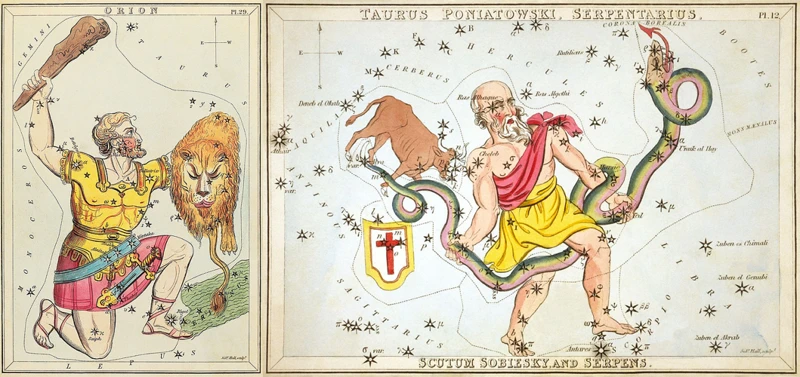
The mythological origins of the Zodiac constellations are woven with captivating stories and ancient beliefs. Each constellation is steeped in rich mythology, transporting us to a world of gods, heroes, and mythical creatures. Aries, the sign of the Ram, is associated with the Golden Fleece and the daring adventures of Jason and the Argonauts. Taurus, the Bull, represents the transformation of Zeus and Europa. The Twins, Gemini, symbolize the inseparable bond between Pollux and Castor, one immortal and the other mortal. Cancer, the Crab, is linked to the story of Hercules and the Twelve Labors. The mighty Leo, the Lion, is believed to be the lion slain by Hercules during his quests. Virgo, the Virgin, is associated with the goddess of harvest, Demeter. Libra, the Scales, tells the story of Astraea, the goddess of justice. Scorpio, the Scorpion, is connected to Orion’s demise. The Archer, Sagittarius, is associated with Chiron, the wise centaur. Capricorn, the Sea-Goat, represents the god Pan and his transformation. Aquarius, the Water-Bearer, symbolizes the divine cup-bearer Ganymede. Pisces, the Fish, tells the story of the goddess Aphrodite and her son Eros. Lastly, Ophiuchus, the forgotten sign, represents the Serpent Bearer and encompasses healing and wisdom in its mythology. These mythological origins add depth and meaning to our understanding of the Zodiac constellations, reminding us of the enduring power of storytelling across different cultures and eras.
The Story of Aries
In Greek mythology, Aries is associated with the story of the Golden Fleece. It all begins with a king named Athamas and his wife, Nephele. They have two children together, a son named Phrixus and a daughter named Helle. However, King Athamas marries another woman named Ino who becomes jealous of Phrixus and Helle. Ino plots to get rid of the siblings by spreading a rumor that a sacrifice to the gods would end a drought affecting the land.
To carry out her devious plan, Ino persuades a messenger to tell Athamas that the Oracle demands the sacrifice of Phrixus. Just as Phrixus is about to be sacrificed, a golden ram with wool as bright as the sun appears, sent by the gods to save the siblings. They climb on its back and it carries them away.
During their journey, Helle falls off the ram’s back and drowns in the sea, which later came to be known as the Hellespont. Phrixus continues the journey alone and eventually reaches the land of Colchis, where he presents the Golden Fleece as a gift to King Aeetes. The Golden Fleece, a symbol of great wealth and power, becomes a renowned treasure sought after by many.
The story of Aries represents bravery, adventure, and escaping danger through divine intervention. It symbolizes the power to overcome obstacles and embark on a journey to find great treasures. Aries individuals are often seen as dynamic and courageous, embodying the spirit of the ram as they fearlessly charge ahead in pursuit of their goals.
The Legend of Taurus
The Legend of Taurus tells the tale of a powerful and majestic bull that played a significant role in Greek mythology. According to the ancient Greeks, Taurus is associated with the mythical creature known as the Cretan Bull. This large and ferocious bull was said to have been created by the god Poseidon as a test for King Minos of Crete. Legend has it that King Minos refused to sacrifice the bull to Poseidon, who was angered by this defiance. In retaliation, Poseidon caused the bull to become wild and uncontrollable, wreaking havoc on the island of Crete. To save his people, King Minos sought the help of the renowned hero, Heracles (Hercules in Roman mythology). Heracles was tasked with capturing the powerful bull and bringing it back to King Minos. With his incredible strength, Heracles was able to subdue the raging animal and successfully completed his task. The captured bull was then brought to mainland Greece where it eventually became one of the constellations in the night sky. Taurus, with its bright star Aldebaran at its head, represents the immortalized Cretan Bull and serves as a reminder of Heracles’ triumph over adversity.
The Twins: Castor and Pollux
The constellation Gemini is associated with the mythological story of the twins, Castor and Pollux. According to Greek mythology, Castor and Pollux were the sons of Leda and Zeus, but they had different fathers. Castor, known for his exceptional horse riding skills, was the mortal son of Leda’s husband, Tyndareus, while Pollux was the immortal offspring of Zeus. The bond between the two brothers was unbreakable, and they shared many adventures together.
In one tale, Castor and Pollux joined the famous quest for the Golden Fleece along with Jason and the Argonauts. Their exceptional bravery and skills as warriors helped them overcome numerous challenges during the journey. The twins became protectors of sailors and were believed to possess the power to calm stormy seas.
Interestingly, the Gemini constellation represents the twins’ eternal bond. The two brightest stars in Gemini, named after Castor and Pollux respectively, are often referred to as the “heavenly twins.” Castor, the second-brightest star in the constellation, is a multiple star system, consisting of six individual stars. Pollux, the brightest star in Gemini, is a giant red star and one of the brightest stars visible to the naked eye.
In astrology, those born under the sign of Gemini are believed to embody the characteristics of the twins. They are known for their versatility, intellectual curiosity, and excellent communication skills. Gemini individuals are often described as charming and sociable, with a knack for adapting to various situations.
The myth of Castor and Pollux within the Gemini constellation highlights the concept of duality and the interconnectedness of different aspects of life. It serves as a reminder that balance and harmony can be achieved through embracing both mortal and divine qualities, just as the twins themselves embodied both human and immortal attributes.
Cancer and the Greek Legend
Cancer, the constellation representing the Crab in the zodiac, is associated with a captivating Greek legend that tells the tale of its origin. According to Greek mythology, the story revolves around Hercules, the mighty hero known for his extraordinary strength and twelve labors. The goddess Hera, who harbored a deep grudge against Hercules, sent an enormous crab to distract and attack him while he was engaged in his battle with the nine-headed Hydra.
This colossal crab proved to be a formidable adversary, attacking Hercules relentlessly with its sharp claws. However, Hercules, with his exceptional strength, managed to crush the crab under his foot, defeating it. As a reward for its valiant effort, Hera immortalized the crab by placing it in the heavens as the constellation Cancer.
This mythological tale encapsulates the symbolism associated with Cancer in astrology. The crab is often seen as a representation of resilience, tenacity, and the ability to adapt and protect oneself when faced with adversity. Additionally, Cancer is associated with traits such as emotional sensitivity, intuition, and a strong connection to the home and family.
In ancient Greek culture, Cancer, with its mythological origin, held a profound significance and was believed to influence the lives and destinies of individuals born under its constellation. Today, those born under the sign of Cancer are often seen as nurturing, empathetic, and fiercely loyal individuals, mirroring the characteristics attributed to the Crab in the Greek legend.
The Myth of Leo
In the realm of the Zodiac constellations, Leo the Lion occupies a prominent place. According to Greek mythology, there are several stories associated with the origin and symbolism of Leo. One popular myth tells the tale of the Nemean Lion, a fearsome creature that terrorized the land of ancient Greece. This monstrous lion had an invulnerable hide, making it impervious to weapons. Its mere presence struck fear into the hearts of both humans and gods alike.
As the legend goes, Hercules, the renowned hero of Greek mythology, was tasked with slaying the Nemean Lion as one of his twelve labors. Armed with his remarkable strength and wit, Hercules embarked on a challenging quest to confront the lion. The fight between Hercules and the lion was fierce, but eventually, Hercules triumphed over the beast by strangling it with his bare hands. After slaying the Nemean Lion, Hercules fashioned a cloak using the lion’s impenetrable hide to serve as a symbol of his extraordinary strength and power.
This mythological tale of Leo manifests in the constellation as a majestic lion. Leo is depicted in the night sky by a group of stars forming the shape of a lion, with its head resembling a backward question mark and a distinctive triangle forming its body.
The constellation of Leo holds various interpretations across different cultures. In ancient Egypt, the lion was associated with the fierce sun god, Sekhmet, who was believed to bring both destruction and healing. In Babylonian astrology, Leo was linked to the king or ruler figure, symbolizing nobility and leadership.
The symbolism of Leo as a lion is still reflected in astrology today. Individuals born under the sign of Leo are often described as confident, charismatic, and naturally inclined towards leadership. They possess a fiery and passionate energy that motivates them to pursue their goals with enthusiasm and determination. Just as the lion is regarded as the king of the jungle, Leos are often seen as ruling their own domains, commanding attention and respect from those around them. The constellation of Leo, with its symbolic tale and powerful representation, continues to captivate and inspire individuals who identify with its persona.
Virgo: The Goddess of Harvest
Virgo, represented by the symbol of a maiden, is associated with the goddess of harvest in mythology. In ancient times, this constellation was often linked to the goddesses of fertility and agriculture, symbolizing abundance and the bountiful harvest. One prominent mythological figure associated with Virgo is Demeter, the Greek goddess of harvest and agriculture. Demeter was known for her role in nurturing the earth and ensuring fruitful harvests. According to the myth, her daughter Persephone was abducted by Hades, leading to Demeter’s grief and the subsequent barrenness of the land. As a result, Demeter’s sorrow caused the crops to wither and die. It was only when Persephone was returned to her that Demeter rejoiced, and the earth flourished with abundance once again. This mythological connection highlights Virgo’s association with the cycles of nature and the importance of the harvest in ancient agricultural societies. In astrology, individuals born under the sign of Virgo are believed to possess traits such as practicality, attention to detail, and a strong work ethic, resembling the industriousness and meticulousness required for a successful harvest.
The Scales: Libra’s Story
The constellation of Libra, symbolized by the scales, is associated with justice, balance, and harmony. In Greek mythology, the story behind Libra involves the goddess Themis, who was known for her unwavering commitment to justice. According to the myth, Themis was the second wife of Zeus and the mother of the three Horae, goddesses of the seasons. It is said that Themis possessed a set of scales, which she used to maintain cosmic balance and ensure fairness.
However, another interpretation of Libra’s origins comes from ancient Babylonian and Egyptian cultures, where the scales were associated with the judgment of souls in the afterlife. The soul would be weighed against the feather of Ma’at, the Egyptian goddess of truth and justice. If the soul was found to be lighter than the feather, it would be deemed pure and allowed to enter the afterlife.
The symbolism of Libra as the scales of justice is further upheld in astrology, where individuals born under this sign are believed to possess a strong sense of fairness, diplomacy, and the desire for harmony in their relationships. They strive for balance in all aspects of life and have a keen eye for weighing options and making sound judgments. Librans are natural peacemakers, using their diplomatic skills to resolve conflicts and bring about harmony in their surroundings.
The story of Libra and its association with scales embodies the universal quest for justice, balance, and harmony. Whether through the lens of Greek mythology or the ancient judgment of souls, Libra’s story continues to remind us of the importance of fairness and equilibrium in our lives.
The Scorpion’s Tale
According to Greek mythology, the story of Scorpio originates with the legendary hunter, Orion. Orion was known for his exceptional hunting skills and his boastful nature. However, his arrogance caught the attention of the goddess of hunting, Artemis, who took offense at his constant bragging about his abilities. In an attempt to humble Orion, Artemis sent a giant scorpion to challenge him. The scorpion, with its deadly sting, engaged in a fierce battle with the hunter. Despite Orion’s strength and skill, he was ultimately stung and killed by the scorpion. In honor of the scorpion’s victory, Zeus, the king of the gods, placed both Orion and the scorpion in the night sky as constellations, but he positioned them at opposite ends to prevent further conflict. Today, the constellation of Scorpio represents the deadly scorpion and serves as a reminder of the consequences of hubris and the power of humility. People born under the sign of Scorpio are believed to inherit traits such as determination, intensity, and passion, as well as the ability to navigate through life’s challenges with resilience. The captivating tale of the scorpion and Orion continues to be a source of inspiration and reflection within the realm of astrology.
Sagittarius: The Archer’s Myth
Sagittarius, the centaur archer, is a prominent constellation in the zodiac, known for its captivating mythological origins. According to Greek mythology, Sagittarius is associated with the legendary figure of Chiron, the wise and noble centaur. Chiron was known as a great healer, teacher, and mentor to heroes such as Hercules and Jason. In the cosmos, Sagittarius represents Chiron in his celestial form, forever immortalized among the stars. As the myth goes, Chiron accidentally wounded himself with a poisoned arrow, which led to immense suffering. Despite his own pain, he used his knowledge of healing to help others and pass on his wisdom. This selflessness and dedication to teaching resonates with the qualities of Sagittarius individuals, who are known for their adventurous spirit, optimism, and intellectual pursuits. Sagittarians are often seen as truth-seekers, philosophical thinkers, and eternal wanderers, embodying the essence of the archer myth. Their fiery nature and relentless pursuit of knowledge make them natural explorers, always ready to embark on new adventures and expand their horizons.
Capricorn and the Sea-Goat
Capricorn, represented by the Sea-Goat, is one of the most intriguing zodiac constellations with a fascinating mythological origin. In Greek mythology, Capricorn is associated with the story of Pan, the god of the wild and shepherds. According to the legend, Pan was playing by the river when the mighty monster Typhon emerged from the water, striking fear into the hearts of the gods. In a panic, the gods transformed themselves into various animals to escape, and Pan leaped into the river, assuming the form of a half-goat, half-fish creature. This hybrid creature came to be known as Capricorn, the Sea-Goat.
The unique fusion of a goat’s body and a fish’s tail reflects the duality of Capricorn’s nature. Capricorns are often characterized as ambitious and disciplined, symbolizing the goat’s ability to climb mountains and reach great heights. They possess a strong work ethic and are driven to achieve their goals. On the other hand, the fish’s tail represents Capricorn’s connection to the element of water, symbolizing their emotional depth and intuition.
Just as goats are skilled climbers, Capricorns are known for their determination and steadfastness in overcoming obstacles. They possess a natural ability to navigate challenging situations and thrive amidst adversity. Capricorns are also highly practical and grounded individuals, often focusing on long-term planning and strategic thinking.
In astrology, Capricorn is an earth sign, representing stability and practicality. Those born under this sign are often reliable, responsible, and motivated individuals. They excel in careers that require discipline, perseverance, and a strong sense of organization. Capricorns are known for their unwavering commitment to success and their ability to lead with authority and integrity.
The Sea-Goat symbolism of Capricorn not only represents the union of land and sea but also signifies the balance between ambition and sensitivity. Capricorns understand the importance of maintaining emotional well-being alongside their pursuit of success, blending their practical nature with compassion and empathy.
Capricorn and the Sea-Goat serve as a reminder of the diverse qualities inherent in individuals born under this zodiac sign. Their mythical origin and symbolism offer insights into the complex and multifaceted nature of Capricorn personalities, inspiring admiration and intrigue.
Aquarius: The Water-Bearer’s Story
Aquarius, known as the Water-Bearer, has a fascinating mythological story associated with it. In ancient Greek mythology, Aquarius is believed to represent the youth Ganymede, who was known for his extraordinary beauty. According to the legend, Ganymede caught the attention of Zeus, the King of the Gods, who was captivated by his charm. Zeus decided to bring Ganymede to Mount Olympus to serve as his personal cup-bearer, replacing Hebe, the daughter of Zeus and Hera.
Zeus was so infatuated with Ganymede that he granted him eternal youth and immortality, and he also placed him among the stars as the constellation Aquarius. From this celestial position, Ganymede was tasked with pouring water from a jug, representing the life-giving element of water being poured down to Earth, symbolizing nourishment, purification, and knowledge. It is said that Aquarius, with its flowing water, brings forth ideas, innovation, and humanitarian values.
Beyond Greek mythology, Aquarius has also played a significant role in other cultures. In Babylonian astrology, this constellation was associated with the god Ea, who was associated with the primordial ocean and wisdom. In Hindu astrology, Aquarius is linked with the god Varuna, who presides over cosmic order and justice.
It is notable to mention that Aquarius is an air sign in astrology, despite being associated with water. This highlights the intellectual and progressive nature of individuals born under this sign. Aquarians are often seen as visionary thinkers, humanitarian, and advocates for change and equality. Their desire to make a positive impact on the world aligns with the mythological symbolism of Aquarius as the Water-Bearer.
As a water symbol, Aquarius also signifies the importance of emotions, deep connections, and spiritual growth. Individuals born under this sign are encouraged to be open-minded, embrace their unique qualities, and channel their energy towards making a difference in society.
The story of Aquarius as the Water-Bearer reflects the blending of mythology and astrology, emphasizing the values of youth, innovation, and the importance of nurturing the human experience. Whether viewed through the lens of Greek mythology or the broader astrological context, Aquarius continues to inspire individuals to embrace their individuality and work towards creating a better world for all.
Pisces: The Fish and Aphrodite
In Greek mythology, the constellation Pisces is associated with the story of Aphrodite, the goddess of love and beauty. The tale goes that Aphrodite and her son Eros were escaping the grip of the ferocious Typhon, a monstrous creature. In their haste, they transformed themselves into a pair of fish and plunged into a river for safety. The fish swam side by side, their tails intertwined, symbolizing unity and harmony. It is from this myth that the constellation Pisces takes its name. The intertwined fish of Pisces are often depicted swimming in opposite directions, representing duality and balance. In astrology, those born under the sign of Pisces are said to possess a deep sense of empathy, creativity, and spirituality. They are often characterized by their compassionate nature and their ability to understand the emotions of others. Just as the fish in the constellation symbolize unity, Pisces individuals are known for their strong bonds in relationships and their desire for emotional connection. They are often considered dreamers and visionaries, guided by their intuition and a profound connection to the spiritual realm. The myth of Pisces and Aphrodite serves as a reminder of the power of love, empathy, and the importance of finding balance within oneself and in relationships with others.
Ophiuchus: The Forgotten Sign
Ophiuchus, also known as the “Forgotten Sign,” is a lesser-known constellation that lies along the ecliptic, the path of the sun in the sky. Despite not being officially recognized as part of the traditional zodiac, Ophiuchus has gained attention in recent years.
Ophiuchus is represented as a man holding a serpent, symbolizing healing and wisdom. In Greek mythology, Ophiuchus is associated with the figure of Asclepius, the god of medicine and healing. Asclepius was known for his ability to resurrect the dead, which disrupted the balance of life and death, leading to his eventual demise. In honor of Asclepius, Ophiuchus became a constellation in the night sky.
The traits attributed to individuals born under the Ophiuchus sign align with its symbolic representation. Ophiuchus individuals are believed to possess great healing abilities and a thirst for knowledge and wisdom. They are often seen as seekers of truth and have a natural inclination towards spiritual and mystical pursuits.
While Ophiuchus doesn’t fit neatly into the traditional zodiac system, some astrologers argue that its inclusion alters the dates associated with the other zodiac signs. This has caused debate and confusion among astrology enthusiasts, as well as sparked discussions about the validity and interpretation of astrological charts.
It is important to note that mainstream astrology still predominantly follows the twelve zodiac signs, and the inclusion of Ophiuchus remains a matter of personal interpretation and belief.
Nevertheless, the fascination and curiosity surrounding Ophiuchus continue to grow. Many people are drawn to the idea of this “Forgotten Sign,” seeking insight into its unique characteristics and how it may interact with the other zodiac signs. Whether one includes Ophiuchus or not, its presence serves as a reminder of the complexity and diversity of the celestial world and the continuous exploration of astrology as a whole.
Conclusion
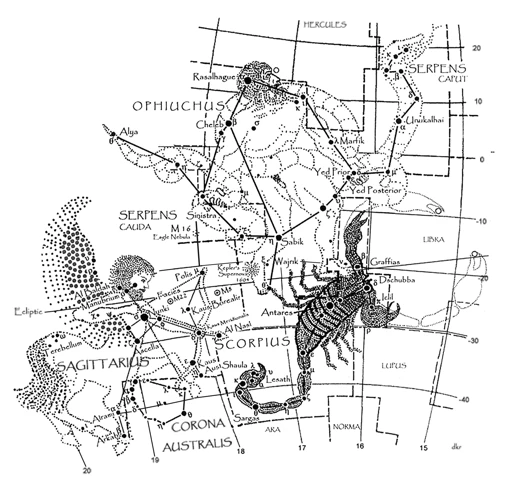
The of exploring the Zodiac constellations and their mythological origins reveals the enduring fascination humanity has held for the night sky and its celestial wonders. Throughout history, these twelve constellations have served as guides, storytellers, and sources of inspiration for cultures around the world. The intricate myths and legends associated with each constellation highlight the human desire to understand and interpret the cosmos.
From Aries the Ram to Ophiuchus the Serpent Bearer, these constellations have served as a source of wisdom and introspection. Each sign carries its own unique symbolism and characteristics, offering individuals a chance to explore their own personality traits and connect with the mysteries of the universe.
As we delve into the mythological origins of each zodiac constellation, we discover the rich tapestry of stories woven by ancient civilizations. These tales reflect the values, beliefs, and aspirations of different cultures, showcasing the universal human quest for meaning and connection.
In conclusion, the zodiac constellations and their mythological origins bring together ancient wisdom, astronomical marvels, and human imagination. Whether you believe in astrological interpretations or simply appreciate the beauty of the night sky, these constellations continue to captivate and inspire. They remind us of our shared heritage and the vastness of the cosmos that stretches beyond our comprehension. So, the next time you glimpse one of these celestial figures in the night sky, take a moment to ponder the stories and legends that have been passed down through generations, connecting us to the mysteries of the universe.
Frequently Asked Questions
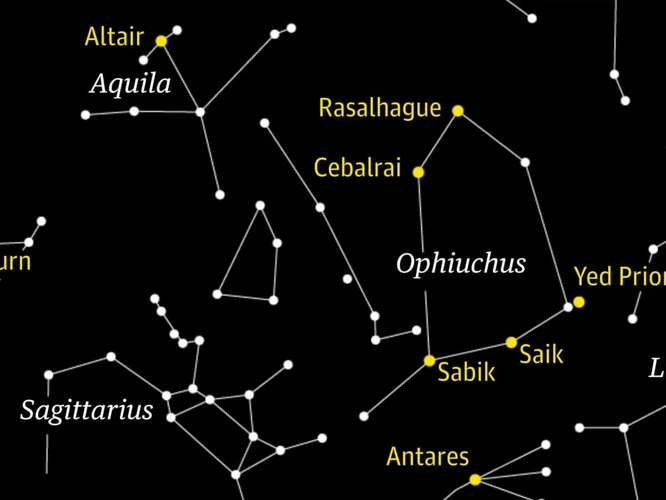
What is astrology?
Astrology is a belief system that suggests a connection between the positions and movements of celestial bodies and events taking place on Earth. It is often used to interpret personality traits, predict future events, and analyze compatibility between individuals.
How old is astrology?
Astrology has a long and rich history, dating back over thousands of years. Its origins can be traced to ancient civilizations such as Mesopotamia and ancient Egypt, where the study of celestial bodies and their influence on human life began.
Why are there 12 zodiac constellations?
The concept of dividing the zodiac into 12 constellations can be attributed to ancient Babylonian astronomers. They observed that the Sun passed through different constellations during different times of the year, and divided the zodiac into equal parts to create a standardized system.
Are the zodiac signs the same as the constellations?
While the zodiac signs are named after the constellations, they are not directly tied to their current positions in the sky. Due to the phenomenon known as “precession,” the Earth’s axis gradually shifts over time, causing a slight discrepancy between the zodiac signs and their corresponding constellations.
Is astrology considered a science?
Astrology is not considered a scientific discipline in the traditional sense. It does not adhere to the rigorous scientific method and lacks empirical evidence to support its claims. However, astrology continues to be practiced and studied as a belief system with cultural and personal significance.
Can astrology predict the future?
Astrology is often used to make predictions about future events and personal outcomes. However, it is important to note that the accuracy and reliability of astrological predictions vary widely. Many factors can influence the outcome of events, and astrology should be approached with a critical and open mind.
What is the significance of the zodiac constellations?
The zodiac constellations hold great cultural and symbolic significance. They provide a framework for understanding personality traits, guiding life choices, and interpreting cosmic influences. They serve as a way to connect individuals with the larger universe and deepen their understanding of themselves and others.
Are there any new zodiac signs?
In recent years, there has been some debate surrounding the inclusion of a 13th zodiac sign called Ophiuchus. However, this constellation is not widely recognized within mainstream astrology and does not have the same historical significance as the 12 traditional zodiac constellations.
Can astrology help improve relationships?
Astrology can offer insights into the compatibility and dynamics between individuals in a relationship. By understanding each person’s zodiac signs and their corresponding traits, individuals can gain a deeper understanding of their partner’s strengths, weaknesses, and potential areas of conflict. However, astrology is just one tool among many for understanding relationships and should not be the sole determining factor in decision-making.
Is there a scientific basis for the influence of astrology?
From a scientific standpoint, there is currently no empirical evidence to support the influence of astrology on human lives. However, astrology continues to be embraced and practiced by individuals who find personal meaning and guidance in its principles. Its influence is more subjective and rooted in personal beliefs and interpretations.
References
- The Myths Of The Constellations.
- The Origin of Zodiac Signs Symbols
- 13 Legendary Constellations & Their Stories From Greek …
Frequently Asked Questions

1. How many zodiac constellations are there?
There are a total of 12 zodiac constellations in astrology.
2. What is the significance of the zodiac constellations in astrology?
The zodiac constellations hold great significance as they are used to determine an individual’s personality traits, behavior patterns, and even predict future events based on their position at the time of birth.
3. Are the zodiac constellations the same as the astrological signs?
Although the zodiac constellations and astrological signs are often used interchangeably, they are not exactly the same. The constellations are the actual star patterns, while the astrological signs are a representation of these constellations in a simplified form.
4. Is Ophiuchus a part of the zodiac constellations?
While Ophiuchus is often considered the 13th zodiac sign, it is not officially recognized as a part of the zodiac constellations in astrology.
5. What is the mythological origin of Aries?
Aries, the first sign of the zodiac, is associated with the Greek myth of the Golden Ram. In the myth, the ram was sent by Zeus to rescue the children of the King Athamas and his wife Nephele.
6. What is the story behind Cancer, the Crab?
The story of Cancer involves the Greek hero Heracles (Hercules) and the Crab sent to hinder his success in completing one of his Twelve Labors. The Crab was eventually defeated and placed among the stars as the constellation Cancer.
7. Who were the Gemini twins in mythology?
The Gemini twins, Castor and Pollux, were the sons of Leda and Zeus in Greek mythology. They were known for their brotherly love and were immortalized as the constellation Gemini.
8. What is the connection between Leo and Greek mythology?
Leo is associated with the myth of the Nemean Lion, a fierce creature slain by the hero Heracles as the first of his Twelve Labors. The lion’s pelt was then worn by Heracles as a symbol of his strength and courage.
9. What is the story behind Pisces, the Fish?
In Greek mythology, Pisces is associated with the story of Aphrodite and her son Eros. When the two fled from a monster, they transformed themselves into fish and leaped into a river to escape. As a reward, they were immortalized as the constellation Pisces.
10. Why is Ophiuchus often forgotten or omitted from the zodiac?
Ophiuchus is often forgotten or omitted from the zodiac due to historical reasons and the fact that the zodiac originally consisted of 12 equal divisions. However, some astrologers do recognize Ophiuchus as a significant constellation and include it in their interpretations.
References
- The Greek Origin of Zodiac Signs in Astrology
- The Origin of Zodiac Signs Symbols
- List of the Constellations




